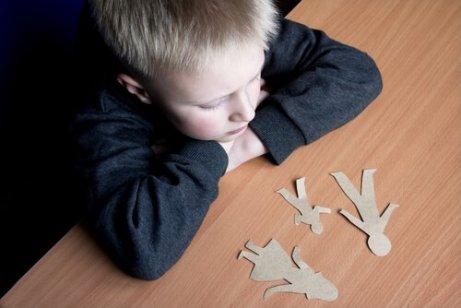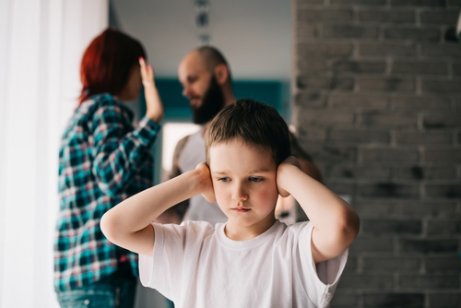How Divorce Affects Children, According to Their Age

Divorce affects children in many different ways. Everything depends on each child’s particular situation, including factors such as age.
In this article, we’ll focus on how divorce affects children, depending on their age. This will help you if you’re facing a divorce or separation, or if you know someone who is going through this situation.
How divorce affects children, according to age
Undoubtedly, when a couple decides to separate and there are kids involved, they’re concerned about the emotional health of their children. The question they’ll be asking is: how can we do this so that the divorce affects them as little as possible? What’s the best way of going about it?
A divorce is never pleasant, no matter how old the child is. However, the child’s experience and reactions are different depending on their age.
Of course, everything depends on whether it’s an amicable agreement or if it’s a constant battleground. Other factors include the children’s personality, and even the way in which the parents face the situation and explain it to the children.
Here’s a guide to how separation or divorce affects children, broken down by age group. We hope it will help if you or people you know have to face this traumatic situation.
1. Before birth and up to one year of age
Did you know that a separation can affect babies even before they’re born? It’s quite logical, because the mother’s state of mind affects the child’s development. There are many cases of children who have problems with their cognitive development or with low weight when a traumatic event has happened during their mother’s pregnancy.
We tend to think that babies don’t understand anything that is happening around them. However, the truth of the matter is that they’re very receptive beings. They very often reflect exactly what their parents do and feel!
If the mother is depressed, irritable or tense because of the situation, then the baby will feel the same way too. He’ll probably cry more, want to be in your arms more than usual, and may not play with his toys.

2. Between 1 and 3 years of age
At this age, they aren’t able to fully understand what is happening yet, but they do feel the stress in many ways. At this stage, many fears and anxieties may appear, as well as backward steps in their development.
Some examples of this can be talking in a childish way, wetting their bed, having nightmares, an increased fear of the dark, among other things.
Another response to parental separation at this age is increased irritability and aggressiveness. If they have siblings, they may take it out on them. The same can happen with friends and cousins in daycare centers. It’s important to remember that children often express their sadness with aggression.
“A divorce is never pleasant, no matter how old the child is. However, the experience is different depending on their age”
3. Between 4 and 7 years of age
So, how does divorce affect children who have already started school? At this age they can now understand the situation better, although that doesn’t mean they’ll accept it. It’s very important to explain things to them in the best possible way, and with language and examples they can understand easily.
Keep in mind that children of this age will think that everything is caused by them. They’ll feel that they’re to blame for the situation.
Because of this, they’ll likely have difficulty focusing on their school work. Fears from the past may reappear (a monster or ghost for example), and they may start wetting themselves again. Their speech and eating can also be affected.

4. Between 7 and 12 years old
This is known as the “latency stage” because children are less active than before, as far as development is concerned. They now have to focus much of their energy on school and homework. As for their emotions, they tend to become less egocentric and more sensitive to what is happening to people around them.
This is the age at which they’re able to understand more clearly what divorce is, but they don’t usually express any opinion about it. The child may suffer nightmares, feel sad or angry, and have problems with tests or school work.
5. From 12 years upwards
At this stage of life, children are unlikely to accept their parents‘ divorce. This is because they’re trying to find their own identity and their hormones are all over the place. The separation of their parents can make them feel insecure and they may become disobedient and rebellious.
This is a basic guide to the different ways that divorce affects children according to their age. If your children ever have to overcome this complex and traumatic situation, then this will help you recognize and understand the way they react.
Divorce affects children in many different ways. Everything depends on each child’s particular situation, including factors such as age.
In this article, we’ll focus on how divorce affects children, depending on their age. This will help you if you’re facing a divorce or separation, or if you know someone who is going through this situation.
How divorce affects children, according to age
Undoubtedly, when a couple decides to separate and there are kids involved, they’re concerned about the emotional health of their children. The question they’ll be asking is: how can we do this so that the divorce affects them as little as possible? What’s the best way of going about it?
A divorce is never pleasant, no matter how old the child is. However, the child’s experience and reactions are different depending on their age.
Of course, everything depends on whether it’s an amicable agreement or if it’s a constant battleground. Other factors include the children’s personality, and even the way in which the parents face the situation and explain it to the children.
Here’s a guide to how separation or divorce affects children, broken down by age group. We hope it will help if you or people you know have to face this traumatic situation.
1. Before birth and up to one year of age
Did you know that a separation can affect babies even before they’re born? It’s quite logical, because the mother’s state of mind affects the child’s development. There are many cases of children who have problems with their cognitive development or with low weight when a traumatic event has happened during their mother’s pregnancy.
We tend to think that babies don’t understand anything that is happening around them. However, the truth of the matter is that they’re very receptive beings. They very often reflect exactly what their parents do and feel!
If the mother is depressed, irritable or tense because of the situation, then the baby will feel the same way too. He’ll probably cry more, want to be in your arms more than usual, and may not play with his toys.

2. Between 1 and 3 years of age
At this age, they aren’t able to fully understand what is happening yet, but they do feel the stress in many ways. At this stage, many fears and anxieties may appear, as well as backward steps in their development.
Some examples of this can be talking in a childish way, wetting their bed, having nightmares, an increased fear of the dark, among other things.
Another response to parental separation at this age is increased irritability and aggressiveness. If they have siblings, they may take it out on them. The same can happen with friends and cousins in daycare centers. It’s important to remember that children often express their sadness with aggression.
“A divorce is never pleasant, no matter how old the child is. However, the experience is different depending on their age”
3. Between 4 and 7 years of age
So, how does divorce affect children who have already started school? At this age they can now understand the situation better, although that doesn’t mean they’ll accept it. It’s very important to explain things to them in the best possible way, and with language and examples they can understand easily.
Keep in mind that children of this age will think that everything is caused by them. They’ll feel that they’re to blame for the situation.
Because of this, they’ll likely have difficulty focusing on their school work. Fears from the past may reappear (a monster or ghost for example), and they may start wetting themselves again. Their speech and eating can also be affected.

4. Between 7 and 12 years old
This is known as the “latency stage” because children are less active than before, as far as development is concerned. They now have to focus much of their energy on school and homework. As for their emotions, they tend to become less egocentric and more sensitive to what is happening to people around them.
This is the age at which they’re able to understand more clearly what divorce is, but they don’t usually express any opinion about it. The child may suffer nightmares, feel sad or angry, and have problems with tests or school work.
5. From 12 years upwards
At this stage of life, children are unlikely to accept their parents‘ divorce. This is because they’re trying to find their own identity and their hormones are all over the place. The separation of their parents can make them feel insecure and they may become disobedient and rebellious.
This is a basic guide to the different ways that divorce affects children according to their age. If your children ever have to overcome this complex and traumatic situation, then this will help you recognize and understand the way they react.
All cited sources were thoroughly reviewed by our team to ensure their quality, reliability, currency, and validity. The bibliography of this article was considered reliable and of academic or scientific accuracy.
- Amato, P.; Keith, B. (1991). Parental divorce and the well-being of children: A meta-analysis. Psychological-Bulletin, 1991 Jul; 110 (1): 26-46
- Caplan, G. (1993). Prevención de los trastornos psicológicos en los hijos de padres divorciados. En: Caplan, G. Aspectos preventivos en salud mental. Barcelona: Paidós.
- Garin, P. B. (1992). Un análisis exploratorio de los posibles efectos del divorcio en los hijos. Psicothema, 4(2), 491-511.
- Salvador, G. P., & Del Barrio, V. (1995). El efecto del divorcio sobre la ansiedad de los hijos. Psicothema, 7(3), 489-497. https://www.redalyc.org/pdf/727/72707302.pdf
- Shaw, D. (1991) The Effects of divorce on children’s adjustment. Behavior Modification, 15(4), 456-485.
- Testor, C. P., Pujol, M. D., Vidal, C. V., & Alegret, I. A. (2009). El divorcio: una aproximación psicológica. Universidad Ramon Llull, 2, 39-46. https://www.researchgate.net/profile/Carles_Testor/publication/242775375_El_divorcio_una_aproximacion_psicologica/links/54e43ae50cf282dbed6ea7ba/El-divorcio-una-aproximacion-psicologica.pdf
This text is provided for informational purposes only and does not replace consultation with a professional. If in doubt, consult your specialist.








